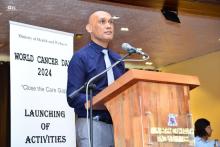Mauritius mobilizes to Close the Care Gap
Mauritius celebrated World Cancer Day 2024 against a backdrop of rising cancer cases, in line with global trends. In fact, the International Agency for the Research on Cancer (IARC) and World Health Organization (WHO) predict that new cases worldwide will increase by 50% annually over the next 15 years, and 77% by 2050. This increase in cases is due to an aging population and the increased exposure to risk factors such tobacco, alcohol, unhealthy diets, pollution and insufficient physical exercise.
The main theme of World Cancer Days since 2022, namely Close the Care Gap, aims to mobilize the necessary attention and resources to ensure that the rising burden of cancer can be addressed in an equal manner across the globe and that all people in the world have access to systematic testing, and early diagnostic and treatment. Unfortunately, inequality of access leads to unequal cancer outcomes between developed and developing countries; this celebration advocates for such inequalities to be reduced in the coming years.
During a ceremony to launch World Cancer Day 2024 organized by the Ministry of Health and Wellness (MOHW), the WHO representative (WR) in Mauritius, Dr Anne Ancia, provided a reminder of the global cancer toll. In 2022 alone, more than 20 million new cancer cases were detected across the globe, while 10 million people lost their lives to the disease. “Many of these fatalities could have prevented or at least delayed,” she explained.
In order to stem the increase in new cases, Government has introduced a National Cancer Control Programme 2022-2025. The Minister of Health and Wellness, Dr Kailash Jagutpal, made clear that “prevention is a key element of this strategic plan. 40% of cancers can be avoided by adopting healthy lifestyles.” He noted that Government aims to screen 100,000 women yearly as a way of promoting the early detection of breast cancer, which represents the bulk of new cases.
In 2022, for example, 671 new cases of breast cancer were registered, compared to 290 cases of prostate cancer. Along with the importance of reducing the prevalence of risk factors such as smoking, obesity, excessive alcohol consumption and lack of exercise, there is a pressing need to Close the Care Gap that can affect certain communities. “Many cancers can be cured if they’re detected and treated early, before the cancerous cells can spread beyond the organs where the tumour originated,” stated the WHO representative, Dr Ancia.
The example of breast cancer is particularly relevant in this context. Having remained relatively unchanged during the 1980s, breast cancer fatalities started dropping significantly in the following decade after the widespread introduction of systematic screening and early detection programmes, coupled with comprehensive and timely cancer treatment protocols. This meant that breast cancer went from being a virtual death sentence to a disease with a high survival rate, on condition of it being detected early.
Dr Ancia also reiterated the WHO’s staunch support for Mauritius – at country, regional and international levels - in its efforts to combat cancer. The Country Cooperation Strategy 2023-2026 which was signed in January last year forms the cornerstone of the WHO’s strategy to support Mauritius in the realisation of its “health-related Sustainable Development Goals”.
Its four strategic priorities are: Building resilient health systems to advance Universal Health Coverage; Strengthening emergency preparedness and response; Promoting health and healthy environments for all Mauritians through multisectoral engagement; and Supporting use of data and innovation for integrated, people-centred care.





